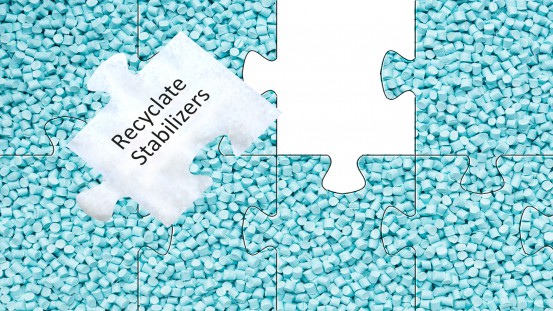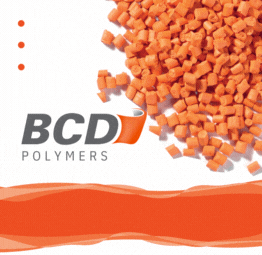These pioneering stabilizers are capable of reducing the effects of previous damage to such an extent that recycled materials become suitable for processing into sophisticated molded products. In its ongoing development, Fraunhofer LBF is collaborating closely with L. Brüggemann GmbH & Co. KG, a leading manufacturer of tailor-made high-performance additives for engineering plastics, who will also be responsible for production and worldwide distribution.
Swift progress from development to market
Fraunhofer LBF has used its extensive know-how on the effects of polymer additives such as antioxidants, light stabilizers, flame retardants and nucleating agents to tackle the special challenges posed by recycled materials. Due to their special reactivity, the new stabilizer systems have the potential to neutralize the effects of previous damage, paving the way for the production of recyclate with processing properties and long-term heat stability that are similar to those of virgin material. The new systems are based partially on renewable raw materials, additionally contributing to a reduced CO2 impact on the environment. Achieving this development target was accelerated with the support of the recently launched "Circular Plastics Economy" research cluster, i.e. five institutes of the Fraunhofer-Gesellschaft working with their stakeholders to develop system services for a functioning circular plastics industry, ranging from prototypes and recycling to acceptance processes and business models.
"With its many years of comprehensive experience in the field of polymer additives and its worldwide market penetration, Brüggemann is the right partner to bring our ideas for the upcycling of plastics to market quickly," emphasizes Dr. Rudolf Pfaendner, Head of the Plastics Division at Fraunhofer LBF. Building on the work of Fraunhofer LBF, Brüggemann will use its know-how and technical potential to optimize formulations. The company will adapt the stabilizers to the requirements of customers and markets, provide technical application advice and will take over large-scale production, quality assurance and worldwide marketing.
Well-prepared for production and marketing
Brüggemann traditionally focuses on high-performance additives for polyamides, including heat, processing and light stabilizers, process auxiliaries and modifiers. Marketed under the BRUGGOLEN® brand, these additives ensure processing efficiency, extended component service life and high quality under economically favorable conditions, in both injection molding and extrusion. The company is currently going through significant expansion and its new, highly automated facility will also produce the new additives for polyolefin recycling.
Dr. Klaus Bergmann, Head of Polymer Additives at Brüggemann: "Continuous development is an essential basis for our company's success. We are very pleased to have entered into a cooperation agreement with the Fraunhofer LBF to expand our portfolio of recycling additives to polyolefins. Ultimately, our goal is to significantly improve the quality of recyclates with the help of innovative additives, thereby making an important contribution to the upcycling of plastic waste.”
At K2019, Brüggemann had presented reactive chain modifiers for polyamide recyclates that enable precise and robust adjustment of the molar masses and viscosities required for the respective application. Even small amounts of additive and a single extrusion step are sufficient to produce recyclates, the properties of which are at the level of virgin materials.



